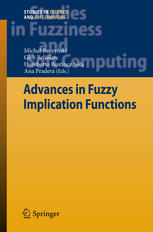

Most ebook files are in PDF format, so you can easily read them using various software such as Foxit Reader or directly on the Google Chrome browser.
Some ebook files are released by publishers in other formats such as .awz, .mobi, .epub, .fb2, etc. You may need to install specific software to read these formats on mobile/PC, such as Calibre.
Please read the tutorial at this link: https://ebookbell.com/faq
We offer FREE conversion to the popular formats you request; however, this may take some time. Therefore, right after payment, please email us, and we will try to provide the service as quickly as possible.
For some exceptional file formats or broken links (if any), please refrain from opening any disputes. Instead, email us first, and we will try to assist within a maximum of 6 hours.
EbookBell Team

5.0
18 reviewsFuzzy implication functions are one of the main operations in fuzzy logic. They generalize the classical implication, which takes values in the set {0,1}, to fuzzy logic, where the truth values belong to the unit interval [0,1]. These functions are not only fundamental for fuzzy logic systems, fuzzy control, approximate reasoning and expert systems, but they also play a significant role in mathematical fuzzy logic, in fuzzy mathematical morphology and image processing, in defining fuzzy subsethood measures and in solving fuzzy relational equations.
This volume collects 8 research papers on fuzzy implication functions.
Three articles focus on the construction methods, on different ways of generating new classes and on the common properties of implications and their dependencies. Two articles discuss implications defined on lattices, in particular implication functions in interval-valued fuzzy set theories. One paper summarizes the sufficient and necessary conditions of solutions for one distributivity equation of implication. The following paper analyzes compositions based on a binary operation * and discusses the dependencies between the algebraic properties of this operation and the induced sup-* composition. The last article discusses some open problems related to fuzzy implications, which have either been completely solved or those for which partial answers are known. These papers aim to present today’s state-of-the-art in this area.